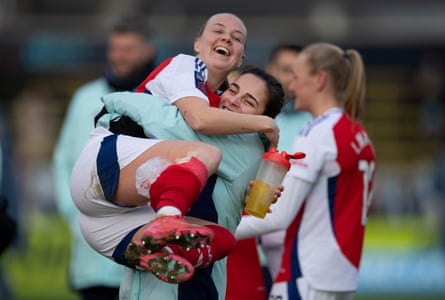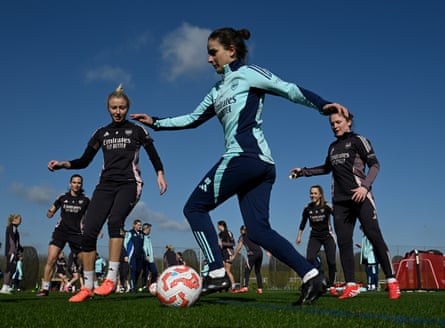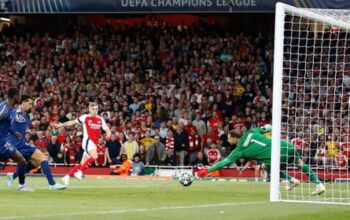‘The tactical side is the easier part of the job because it’s like mathematics,” says Renée Slegers. “The challenging part is the people, in a positive way; that’s where the most energy goes, and I think that’s right.”
The Arsenal manager is on a sofa in her office, relaxed and open as we talk about how much of coaching is psychological and how much is tactical. Is the psychological side the most enjoyable part of the job, then? “I like the combination,” says Slegers, after a short pause. “I like puzzles and board games and, for me, tactics are kind of a game, but then working with people I get so much energy. That’s inspiring.”
After four Women’s Super League wins in March, Slegers has been named the Barclays WSL manager of the month for the third time, having picked up the award in December and February, but individual acclaim makes her “uncomfortable”. If Arsenal win at home to Leicester on Tuesday they will go three points behind the leaders, Chelsea, albeit having played a game more. Next Saturday comes the first leg of the Champions League semi-final, at home to Lyon.
Slegers’ leadership style is focused on elevating those around her to do their jobs to the best of their ability. “I want to develop the team and that’s best done with finding the strengths in the people here in this building and empowering those strengths,” she says.
“I believe that with clarity, role clarity, it becomes easier to perform. So we try to give as much clarity as possible to the players, which is always going to be a challenge because you can’t always give the clarity that a player wants … Everyone being able to be themselves, me included, is the environment I want.”
There are no whiteboards in her office, although one long wall has scribblings on it. Below the word BELIEF, in capitals and underlined, is a list: “3 in 6”, “2 in 90” and “0-2 to 3-2”.
Those numbers relate to their most recent games, the ones that show their mettle. The first example of that, though, arrived earlier. Arsenal coming from 2-1 down to beat Bayern Munich 3-2 in December helped Slegers “see the light of what is possible and where we can go as a team”.
“That was a key first moment,” she says. “Then, looking back at the last block of games that we’ve played, in the West Ham game at Meadow Park we go down and then turn the game around to win 4-3, scoring three goals in six minutes. In between the games against Real Madrid, after the 2-0 loss in Spain, we played Liverpool at the Emirates and we scored two goals in 90 minutes.” Less than two weeks earlier they had lost 1-0 to Liverpool in the FA Cup. “These games show us what we can do. We can do a lot of good things across 90 minutes, but 90 minutes is a long time and we don’t need a lot of time to be able to decide a game.”

That is why, with Arsenal trailing Real by two goals in the Champions League quarter-final and the second leg goalless at half-time, the manager and her players were calm. “We were really detailed about the plan for the game and in our preparations and we had a lot of engagement from the players as well,” says Slegers. “We’d shown what we could do as a team in previous games and that enabled us to be so calm, even at half-time when we knew we needed at least three goals.”
In the changing room, the players and staff could see in each other’s eyes that everyone was thinking the same things, full of composure and belief. “It was very special,” Slegers says. “Sometimes, players need to feel emotions and you need motivational and inspirational talks. That’s not what we needed in that moment. It was focused, it was high-performance. ”
The growing, invested and vocal fanbase is a key element of the equation. “They’re a part of why we can be so calm and focus on problem solving. We don’t have to play the role of bringing the energy and the motivation because the fans bring that. So, all that work is off my shoulders and it’s amazing how people together can create something far bigger.”
Arsenal scored three goals in a blistering 13 minutes against Real. “What we’re showing more and more, both the players and the staff, is that we thrive on pressure,” Slegers says. She includes herself in that. “I like to be under pressure. I get the best out of myself. I was like that in school. I wouldn’t get my work done until a couple of hours before a deadline.”
after newsletter promotion
At half-time against Real, with the tension in the crowd palpable, how could she be so calm? “What I’ve learned about myself is that if I am calm then I make better decisions and I see things more clearly. That’s been a journey for me.”
At 36, Slegers is a young manager, only two years older than Arsenal’s captain, Kim Little. After succeeding Jonas Eidevall at the Swedish side Rosengård she joined him at Arsenal as an assistant in September 2023 with a focus on working with players one-on-one. After Eidevall’s exit 13 months later, Slegers was made interim head coach before being given the job permanently in January. Her rise has been rapid and the learning has come thick and fast. After a 13-game unbeaten run, Arsenal lost for the first time under her at the end of January, 1-0 at Chelsea in the WSL, bounced back with a 4-3 defeat of Manchester City in their next league match before losing 2-1 to City in the League Cup semi-finals.

‘My biggest job beforehand, as a head coach, was at FC Rosengård and we basically won all the time because we were the best team in the league and so I wasn’t used to losing that much,” Slegers says. “We did lose in the Champions League group phase, but we were so far off. So, this was new for me, I learned a lot about myself.
“You also gain an understanding of how people work and how people function in hard times and learn what you need to do to support players, people, to be able to get back on track again and keep on going. You learn how to push the right buttons with everyone. The day after a loss, we are more vulnerable and emotional, and accepting that and finding the right strategies for managing it is important. That’s what we tried to do with the whole staff and playing group, and I’m happy with the way the team responded and got back on it so quickly after those losses, because they were big losses for us. We wanted more in the cup competitions especially.”
What did she learn about herself? “I still get emotional about results,” she says. “I have bad nights of sleep and I beat myself up, but not as badly as I would a couple of years ago. I would spin, take all the responsibility for everything that had happened and I would be a mess. I didn’t have a strategy or understanding of how to deal with those emotions. I feel much more composed now. I understand it. If I’ve had a bad night’s sleep, I’m aware I’m tired and will still be emotional and I know that the second day after a defeat is the best day for me to analyse what exactly happened and how we need to move forward.”
There are more big tests of her and Arsenal’s resilience to come. They have four WSL games left and a tricky Champions League semi-final against the eight-time champions. “We need to believe in what we are good at, stick to our identity, but then also be very aware of who they are and what they are going to try to do,” Slegers says of facing Lyon. There is also an opportunity for her to show how far she has come as a coach. In the opposition dugout the former Arsenal manager Joe Montemurro will be a familiar face, and not just to the players. He was Slegers’ mentor on the Uefa coach mentor programme during his time in London.
Source: theguardian.com


